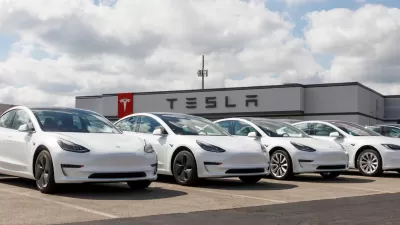Another fatal crash prompts questions about Elon Musk's autopilot claims.

A recent fatal crash outside of Houston highlights the dangers of relying on Tesla's Full Self-Driving Capability, the $10,000 feature that "includes Autopilot, a feature that 'automatically' drives on highways, changing lanes, keeping a car within its lane and at a consistent distance from other vehicles."
Despite the name, Tesla warns against using the features without proper supervision in company materials, writes Aarian Marshall in Wired. "Lengthy blocks of text in Tesla owners’ manuals describe when, where, and how the features should be used: by a fully attentive driver who is holding the steering wheel and is 'mindful of road conditions and surrounding traffic.' That driver shouldn’t be near city streets, construction zones, bicyclists, or pedestrians, the manual says."
The two men died "when their 2019 Model S reportedly slammed into a tree and caught fire," possibly with no driver at the wheel. "Harris County constable Mark Herman said that while local authorities’ preliminary investigation is not complete, they believe no one was behind the wheel of the vehicle when it crashed." The National Highway Traffic Safety Administration and the National Transportation Safety Board are both investigating the incident. "A spokesperson for NHTSA says the agency has opened investigations into 28 Tesla-related crash incidents."
Despite Tesla CEO Elon Musk's claim that "Autopilot's getting good enough that you won't need to drive most of the time unless you really want to" and his unfulfilled 2019 assertion that his company would operate one million robotaxis by the end of 2020, the company told the California Department of Motor Vehicles that "Full Self-Driving will 'remain largely unchanged in the future,' and that FSD will remain an 'advanced driver-assistance feature' rather than an autonomous one."
FULL STORY: A Fatal Crash Renews Concerns Over Tesla’s ‘Autopilot’ Claim

Maui's Vacation Rental Debate Turns Ugly
Verbal attacks, misinformation campaigns and fistfights plague a high-stakes debate to convert thousands of vacation rentals into long-term housing.

Planetizen Federal Action Tracker
A weekly monitor of how Trump’s orders and actions are impacting planners and planning in America.

In Urban Planning, AI Prompting Could be the New Design Thinking
Creativity has long been key to great urban design. What if we see AI as our new creative partner?

Florida Seniors Face Rising Homelessness Risk
High housing costs are pushing more seniors, many of them on a fixed income, into homelessness.

Massachusetts Budget Helps Close MBTA Budget Gap
The budget signed by Gov. Maura Healey includes $470 million in MBTA funding for the next fiscal year.

Milwaukee Launches Vision Zero Plan
Seven years after the city signed its Complete Streets Policy, the city is doubling down on its efforts to eliminate traffic deaths.
Urban Design for Planners 1: Software Tools
This six-course series explores essential urban design concepts using open source software and equips planners with the tools they need to participate fully in the urban design process.
Planning for Universal Design
Learn the tools for implementing Universal Design in planning regulations.
Gallatin County Department of Planning & Community Development
Heyer Gruel & Associates PA
JM Goldson LLC
City of Camden Redevelopment Agency
City of Astoria
Transportation Research & Education Center (TREC) at Portland State University
Jefferson Parish Government
Camden Redevelopment Agency
City of Claremont





























